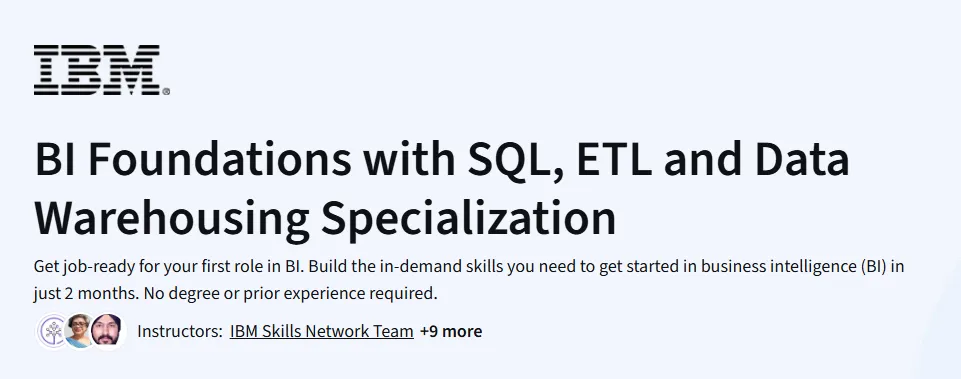What will you learn in BI Foundations with SQL, ETL and Data Warehousing Specialization Course
Master SQL for data extraction and transformation in business environments.
Understand the principles of Extract, Transform, Load (ETL) processes and tools.
Build and manage data warehouse systems using best practices.
Analyze business data to generate meaningful insights for decision-making.
Program Overview
Module 1: Introduction to Data Analytics and Business Intelligence
⏱️ 2 weeks
Topics: Overview of BI, analytics lifecycle, KPIs, BI tools
Hands-on: Case-based analysis of BI applications in real businesses
Module 2: Getting Started with SQL for Data Analysis
⏱️ 3 weeks
Topics: SELECT statements, filtering, joins, aggregations
Hands-on: Querying real datasets using SQL on cloud platforms
Module 3: ETL and Data Pipelines with Shell, Airflow, and Kafka
⏱️ 3 weeks
Topics: Scripting basics, ETL concepts, task scheduling with Airflow, data stream with Kafka
Hands-on: Build a working ETL pipeline and deploy automated data workflows
Module 4: Data Warehousing and BI Analytics
⏱️ 3 weeks
Topics: Star and snowflake schemas, OLAP, data marts, data governance
Hands-on: Design and populate a mini data warehouse and run analytics
Get certificate
Job Outlook
High demand for BI Analysts and Data Engineers skilled in SQL and data warehousing.
Business Intelligence market is projected to grow at 8–10% CAGR through 2030.
Roles pay $70,000–$120,000 annually depending on specialization and experience.
Valuable for roles like BI Developer, Data Warehouse Analyst, or ETL Developer.
Specification: BI Foundations with SQL, ETL and Data Warehousing Specialization
|
FAQs
- No heavy programming background is required.
- Basic familiarity with spreadsheets or data handling is helpful.
- SQL syntax is taught from beginner-friendly examples.
- ETL and warehousing tools are introduced with guided practice.
- Consistency and practice matter more than prior coding knowledge.
- BI emphasizes data organization, integration, and reporting.
- Data Science focuses more on statistics, ML, and predictive analytics.
- BI professionals create reliable data pipelines and warehouses.
- Data Scientists rely on BI teams for clean and structured data.
- Both fields complement each other but have distinct roles.
- BI Analyst or Business Intelligence Developer.
- Data Warehouse Analyst or ETL Developer.
- Data Engineer in enterprise environments.
- Roles in finance, healthcare, e-commerce, and consulting.
- A pathway toward advanced cloud data engineering positions.
- Includes real-world case-based BI applications.
- Hands-on SQL queries with actual datasets.
- Projects using Airflow and Kafka for workflows.
- Mini data warehouse design and implementation.
- Prepares learners to showcase portfolio-ready work.
- Yes, BI is widely used in non-tech industries.
- Finance uses BI for forecasting and compliance reporting.
- Healthcare uses it for patient data management and analytics.
- Retail and e-commerce rely on BI for customer insights.
- Managers and analysts benefit from understanding BI workflows.





